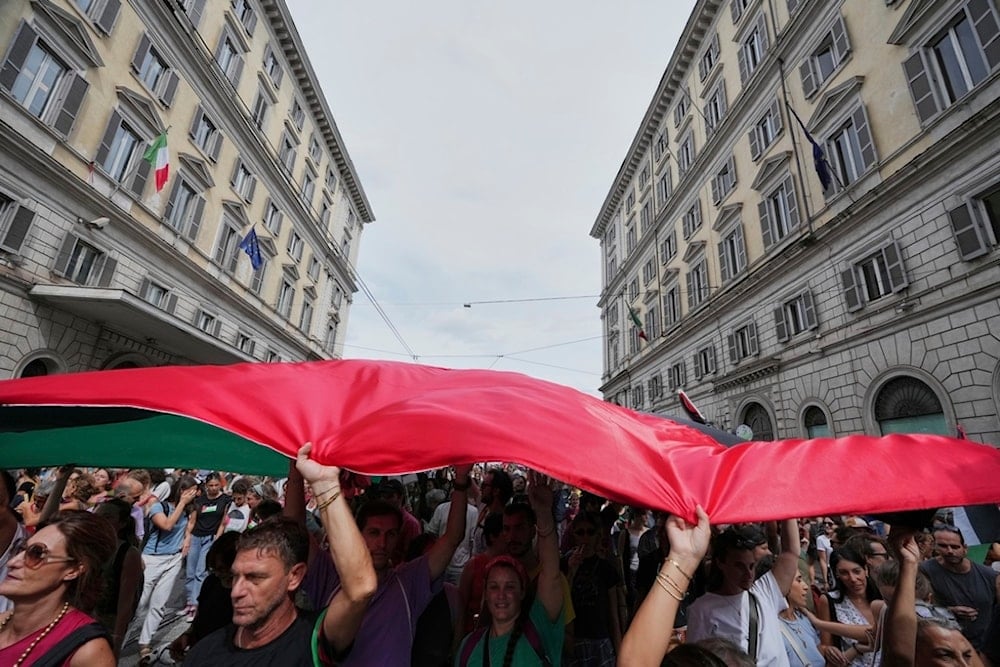Palestinian intellectuals mark two years of Gaza genocide
Palestinian intellectuals mark two years of genocide in Gaza, calling resistance a necessity against the Israeli occupation and global imperialism.
-

People hold a giant Palestinian flag as they participate in a demonstration part of a nationwide protest and general strike against the killings in Gaza, in Rome, Monday, September 22, 2025 (AP)
A group of Palestinian intellectuals released a statement on Wednesday titled “Two years of genocide… resistance as purpose and goal”, denouncing what they described as an ongoing campaign of extermination, starvation, and forced submission targeting the people of Gaza and the wider region.
The statement was signed by five prominent figures, Ghassan Abu Sitta, Subhi Subhi, Seif Daana, Wissam al-Fuqaha, and Salah Hammouri, who stressed that the war on Gaza represents an unprecedented genocidal assault against one of the poorest and most besieged territories in the world. They underlined that this destruction has been waged with the direct participation of major global powers, including the United States, Canada, most European states, and certain Arab and Islamic regimes.
Global complicity and regional expansion
According to the statement, during the first year of the genocide, between October 2023 and October 2024, Western states covered nearly 80% of the war’s expenses, in addition to direct involvement in military, logistical, political, and media operations. The authors noted that such participation extended to coordinated military actions across the wider region.
The intellectuals also pointed to Lebanon, noting that since late 2023, the South, the Bekaa, and Beirut’s southern suburb have been subjected to similar campaigns of annihilation. They said these aim to destroy essential infrastructure and displace communities to deprive the resistance of its social base, in full coordination between the Israeli occupation and Western powers, with the acquiescence of regional regimes.
The statement argued that what is unfolding is not an isolated tragedy, but rather part of a larger American-European imperial project, with the Israeli regime serving as its instrument and “doing the dirty work” on its behalf.
A new pattern of genocide
The signatories insisted that the events in Palestine, Lebanon, and Yemen cannot be reduced to humanitarian disasters or mere violations of international law. They described the campaign as a new form of genocide distinct from those recorded in history, rooted in a settler-colonial expansionist project and backed by unprecedented political, military, ideological, and financial support from the Western imperial order.
They further linked these wars to broader imperial strategies that deploy hunger and annihilation as tools of domination across the Global South, with the Arab region, and Palestine in particular, bearing the heaviest weight in recent decades.
While acknowledging the importance of documentation and legal definitions, the statement stressed that these remain insufficient unless transformed into a liberatory vision that drives organized resistance. Labeling the war as “genocide,” they said, must be the starting point of a comprehensive struggle program, not a mere archival designation for future generations.
The intellectuals lamented what they called a profound absence of revolutionary consciousness in the Arab world, noting that two years of systematic genocide in Gaza have failed to generate adequate responses. They condemned collective silence and the collapse of traditional structures, which they said reflect the dominance of capital and imperial ideology, reshaping public consciousness to accept coexistence with mass killing.
Resistance as necessity
Despite this, the statement praised the sacrifices of martyrs whose blood, it argued, has exposed the brutality of the global order more clearly than ever before, making resistance not a choice but an existential necessity. The authors concluded that organized resistance is not a secondary or moral option, but the only path to defend dignity, protect life, and resist a project that can only yield annihilation.
Quoting the words of late Hezbollah Secretary-General Sayyed Hassan Nasrallah, they reiterated that the “triad of genocide and imperial-Zionist-Arab complicity will never see a white flag,” insisting that resistance will remain committed to hope and to the promise of victory.
“From among the blood and gunpowder, even as darkness closes in on our region, we can still see the dawn of victory and the rising sun of justice,” the statement concluded.
The intellectuals noted that this was their second collective declaration, following a first issued in April 2024 under the title “Against genocide and surrender: for hope, steadfastness, and resistance.”

 4 Min Read
4 Min Read








